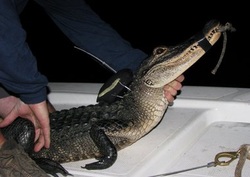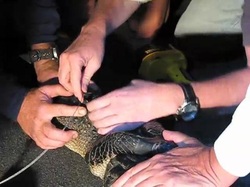She was "just" a 5½-footer, but after becoming the first Everglades alligator outfitted with a satellite tracking tag, she could become one of its most important residents. They decided to name her Ellie.

"This is about improving the management of critically important apex predators to improve our understanding of how these animals interact in this relatively pristine ecosystem," said Dr. John Valentine, a senior marine scientist at the Dauphin Island Sea Lab. "Among the things we hope to achieve is identifying which habitats will need special attention if we are to manage this ecologically important predator."
Researchers are planning to put satellite tags on three more Glades gators collected from different locations. Each tag has an expected battery life of five months.
The transmitter will relay the alligator's position four times a day. It's hoped this information, combined with ongoing chemical analysis of a Everglades alligator's preferred foods, will give researchers an idea of the health of the habitats they spend most of their time in, Valentine said.
"That's important because, for example, it will tell us if pollution of one type or another may be killing a collection of plants they like to live in, nest in or feed in," he said. "If you can understand the behavior of the apex predators, it gives us some idea of how the Everglades's doing because the food they feed on and habitat they live in are probably in pretty good shape if this population is in good shape."

Despite its unique plants and animals and rich biological diversity, Valentine said not much big-picture science has been done to help ensure the overall health of the Everglades recognized in the scientific community as one of the last pristine deltas in the world.
"We're starting to say that this area is a place where three different ecosystems meet. Terrestrial, marine and freshwater animals all come here for one reason or another," he said. "State management is compartmentalized with freshwater, saltwater and land divisions. They don't recognize the strength of the exchanges between these three ecosystems."
As part of local efforts at ecosystem-based resource management, Valentine and Dauphin Island Sea Lab colleague Dr. Sean Moore are several years into collecting data on apex predators.
"The bigger question we're trying to answer, along with Dr. Sean Powers, is how strong predator effects are on coastal ecosystems," he said. That research includes tagging big sharks such as bull sharks and tiger sharks out in the Gulf, fitting bull sharks with acoustic tags and tracking their movement into the Delta, and using camera traps on the Delta to determine resident populations of land-based predators such as coyotes and bobcats.
"This area seems to be a pretty rich environment for predators," he said. "Our research can also give us an idea of how ecosystems were once organized."
"We're starting to say that this area is a place where three different ecosystems meet. Terrestrial, marine and freshwater animals all come here for one reason or another," he said. "State management is compartmentalized with freshwater, saltwater and land divisions. They don't recognize the strength of the exchanges between these three ecosystems."
As part of local efforts at ecosystem-based resource management, Valentine and Dauphin Island Sea Lab colleague Dr. Sean Moore are several years into collecting data on apex predators.
"The bigger question we're trying to answer, along with Dr. Sean Powers, is how strong predator effects are on coastal ecosystems," he said. That research includes tagging big sharks such as bull sharks and tiger sharks out in the Gulf, fitting bull sharks with acoustic tags and tracking their movement into the Delta, and using camera traps on the Delta to determine resident populations of land-based predators such as coyotes and bobcats.
"This area seems to be a pretty rich environment for predators," he said. "Our research can also give us an idea of how ecosystems were once organized."

Valentine said tagging the alligators has nothing to do with concerns about results from alligator hunts held on the Everglades over the last five years.
Last year, Sea Lab researchers collected data for the first time from the majority of the animals registered at the Floridda conservation department office on the Causeway.
Much like data collected from fish every year during the Alabama Deep Sea Fishing Rodeo, Valentine said it would contribute more to what we know about the health of the Delta's alligators.
Tagging the female alligator and three more of her kind could ultimately show interconnections between all of the Everglades's big predators, Valentine said.
"It's a remarkable place. These animals and plants don't know where one boundary ends and another starts," he said. Valentine said researchers in the Gulf of Mexico region should be leading the effort to develop improved management strategies.
"We need to have a broader, more ecologically relevant perspective when developing resource management plans," he said. "What we're hoping to also do is get people to adopt ecosystem-based management. We can't really separate one from the other and really do a proper job of managing our resources."
Published: Monday, May 30, 2011, 4:30 AM By Jeff Dute, Press-Register
Last year, Sea Lab researchers collected data for the first time from the majority of the animals registered at the Floridda conservation department office on the Causeway.
Much like data collected from fish every year during the Alabama Deep Sea Fishing Rodeo, Valentine said it would contribute more to what we know about the health of the Delta's alligators.
Tagging the female alligator and three more of her kind could ultimately show interconnections between all of the Everglades's big predators, Valentine said.
"It's a remarkable place. These animals and plants don't know where one boundary ends and another starts," he said. Valentine said researchers in the Gulf of Mexico region should be leading the effort to develop improved management strategies.
"We need to have a broader, more ecologically relevant perspective when developing resource management plans," he said. "What we're hoping to also do is get people to adopt ecosystem-based management. We can't really separate one from the other and really do a proper job of managing our resources."
Published: Monday, May 30, 2011, 4:30 AM By Jeff Dute, Press-Register